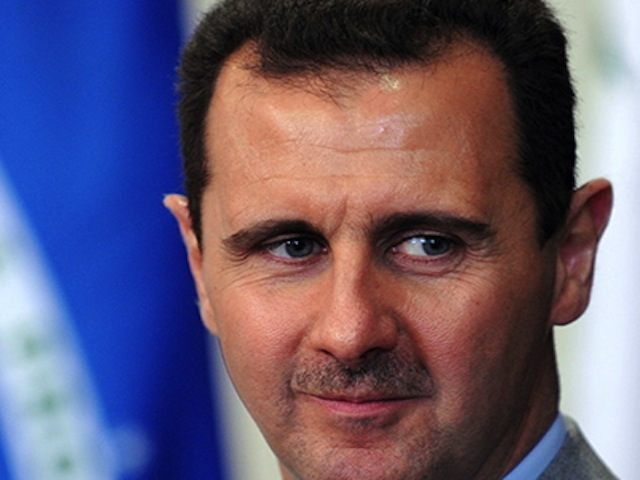Iraqi Foreign Minister Ibrahim al-Jaafari visited Syrian President Bashar al-Assad on Tuesday in an event that appears intended to strengthen ties between Baghdad and Damascus in light of their mutually shared threat of Islamic State (ISIS) invasion. Iraq’s desire to forge stronger ties with Assad flies in the face of American diplomatic efforts to isolate the dictator after his alleged use of chemical weapons on civilians.
Al-Jaafari met with both Assad and Syrian Foreign Minister Walid Muallem. Both parties told the media that their main concern in diplomatic discussion was the fight against Sunni terrorist groups, particularly the Islamic State. The Agence France-Presse quotes al-Jaafari as calling for “neighboring countries to stand with Syria and Iraq” and for the Arab world in particular to “support Syria in its fight against terrorism.”
Syrian leaders expressed hope that neighboring countries would choose to ally with Assad over the Islamic State and assorted factions of Sunni terrorist radicals. “We have great confidence … in the Iraqi leaders who will not spare any effort to support Syria and break the embargo imposed on it,” Muallam said following his meeting with the Iraqi diplomat. As for Assad, he made a public statement on his Twitter account supporting the talks: “Consultation and coordination between Syria and Iraq reinforces the successes of their people and their armed forces in the face of terrorism.”
Muallem also specifically targeted Egypt as a potential ally country, stating, “Syria, Egypt, and Iraq can change the way events are unfolding in the region.” Egypt, now under anti-Islamist President Abdel Fattah al-Sisi, has expanded its diplomatic ties and military cooperation with Israel in an attempt to root out jihadist groups attempting to create strongholds in the Sinai region between the two countries. Sisi has also called for stronger ties to the United States, stating that nations under threat from jihadist groups need America “more than ever,” though the Obama administration has kept its distance from Sisi after supporting Muslim Brotherhood President Mohamed Morsi, currently imprisoned.
The Assad regimes attempt to strengthen ties with both Iraq and Egypt against the Islamic State brings back into the spotlight the Obama administration’s outright refusal to work with Assad, a position supported by other allies in the Middle East who would consider any recognition of Assad as a legitimate leader as a form of betrayal. Secretary of State John Kerry caused a stir this month by saying of Assad, “We have to negotiate in the end,” a statement the State Department rapidly walked back, claiming it was a general assessment of the situation, not a remark on America’s policies with Assad. The comment nonetheless triggered an alarmed response from Turkey, whose government compared any negotiation with Assad to working with Adolf Hitler.
Also hindering any cooperation with Assad is the fact that Assad himself has said on multiple occasions that he sees the United States as de facto allies of the Islamic State, though neither party in that statement would agree. “ISIS was created in Iraq in 2006. It was the United States which occupied Iraq, not Syria. Abu Bakr al-Baghdadi was in American prisons, not in Syrian prisons,” Assad said in an interview with Paris Match last year. “So, who created ISIS, Syria or the United States?” He plainly stated in that interview that the United States “supports terrorists and destruction.”
Yet the United States launched airstrikes to support the Baghdad regime, Assad’s newest close ally, against the Islamic State Wednesday night. Cooperation against the Islamic State in support of the Shiite Baghdad regime is also indirectly a supportive gesture towards Tehran, a strong ally of both Baghdad and Damascus. Any goodwill that attack may appear to engender in Iranian-American relations was immediately countered by reports that the United States is supporting Saudi Arabia’s march into Yemen to prevent the completion of a Shiite Houthi takeover of the formerly Sunni government.
While Assad’s status as friend or foe remains difficult to parse from the standpoint of American diplomacy, the Syrian head of state has been working to build support among Syria’s Christians, who have grown to see Assad as the only thing standing between them and the fate of the Christians of Mosul. In an interview with Al Monitor, one Syrian Christian community leader stated plainly, “There is no question at all about whom we support: the government, of course. It is the only force protecting us from the jihadists and extremists.”
The view that Assad, despite having cemented his reputation as an unsavory international player through his alleged use of chemical weapons, may be worth supporting to eradicate Sunni jihadist terrorists may not be taking hold in Egypt as much as the Syrian government hopes it will. A report from Andalou Agency cites an anonymous Egyptian diplomat claiming that the government is hoping to create a coherent moderate opposition to defeat both Assad and the Sunni jihadists, stating Egypt is “working hard to unite Syrian political factions and is adamant that its efforts are guided by the views of patriotic Syrians, without interference [from Egypt] or external parties.”
“Several figures and political forces have a vested interest maintaining the fragmentation of the Syrian opposition, and have worked to thwart any efforts to unite them,” according to the diplomat. While he did not specify which forces, those most prominently supporting Assad are Iran and Russia.
Where this leaves the war to control Syria and Iraq–which is rapidly becoming a greater-scale war to control all of Islam–remains to be seen, as the United States’ mediator role grows ever more convoluted. Iraqi support for Assad will further alienate Assad opponents like Turkey and put pressure on the United States to further backtrack on its categoric refusal to work with the dictator, and such a situation would issue a massive victory to Assad ally Vladimir Putin.

COMMENTS
Please let us know if you're having issues with commenting.